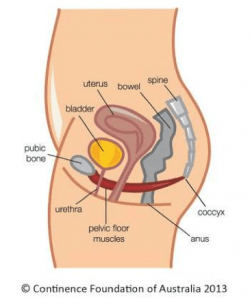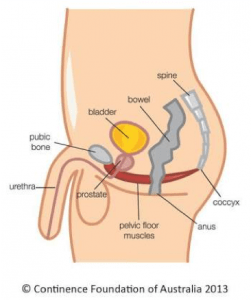At The Physio Movement Townsville, our Women’s Health Physiotherapist is passionate about Women’s Health Physiotherapy and all things Incontinence and Pelvic floor rehabilitation.
What is Stress Incontinence?
Stress incontinence is the leaking of small amounts of urine during activities that increase pressure inside the abdomen and push down on the bladder. This occurs mainly in women and sometimes in men (most often as a result of prostate surgery). The best first treatment against stress incontinence (leaking urine or faeces when you cough or sneeze) may be pelvic floor muscle exercises also known as Kegels.


What are Pelvic floor muscles (PFMs)?
Pelvic Floor Muscles are a group of muscles in the base of your pelvis that stretch like a trampoline or hammock. These are the ‘floor of the core’. Your core muscles are the deep muscle layers close to the spine that provide structural support. The PFMs stretch from the pubic bone (at the front) to the coccyx (tail-bone) at the back, and from side to side.
To assist you in identifying your pelvic floor muscles try stopping the flow of urine on the toilet. Feel the sensation of a contraction (lifting upwards) and notice how the front part of your pelvic floor shuts off the urethra (front passage for passing urine).
However, remember this is not an exercise. Doing a stop start urination more than about once every two weeks can actually cause more urine problems- only to be used as an occasional check that you’re working the right muscles.
The pelvic floor muscles:
- Hold organs including the bladder, uterus (in women) and bowel in place
- Help control the pressure inside the abdomen to deal with pushing down force when we lift or strain helping control the bladder and bowel
- Provide sexual sensation
- Assist with pregnancy and birth
- Work with your deep abdominal (tummy), back muscles and diaphragm (breathing muscle) to stabilise and support the spine
Well-toned or strong pelvic floor muscles allow for:
- Improved bladder and bowel control ( eg. Less leakage or discomfort and more time to get to the toilet)
- Reduced risk of prolapse (eg. Sagging of bladder, bowel and/or uterus into vagina)
- Better recovery from childbirth
- Increased sexual sensation and orgasmic potential for both women and men
- Increased confidence in social settings
- Better recovery from surgery (prolapse, prostate)
- Reducing the risk of prolapse
If you have any of the following, this is a sign you may have weak pelvic floor muscles:
- Leaking urine or faeces when coughing, sneezing, laughing, or lifting
- Hurrying to the toilet to empty bladder or bowel
- Difficulty controlling bowel movements and wind
- Feeling as if the bladder or bowel has not fully emptied after using the toilet
- Lack of sensation during sex
Additionally: a bulge in vagina (prolapse) and/or a dragging, heavy sensation in the vagina you must seek advice from your doctor, continence physiotherapist or continence nurse advisor.
Can you make Pelvic Floor muscles stronger?
Yes, with a PFM exercise program. But it is important to always be aware of your pelvic floor whenever you are exercising to help protect the muscles – at the gym, running, fitness group classes -or any job involving heavy lifting.
Some women have tight PFMs. Tightness in this muscle group can result in pelvic pain, sexual symptoms and problems with bladder-emptying. This again needs to be discussed with a health professional.
What are PFM or Kegel exercises
PFM exercises or Kegel exercises strengthen the pelvic floor. They’re effective only if they’re done correctly: otherwise they won’t do any good, and may even make the pelvic floor weaker.
If you have any concerns with any of the above mentioned, please contact TPM on 1300 876 348 to teach you exactly the right way to do these exercises, being guided and monitored through your individual PFM training program, will give you the best results.
Book Now with our Women’s Health Physiotherapist for a confidential and private consultation.


